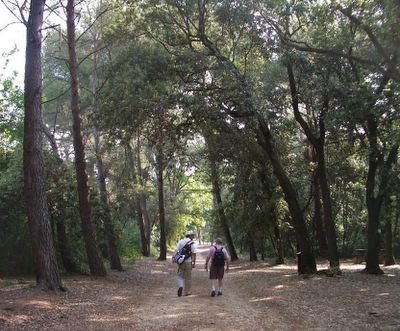Under Weigh in St. Tropez
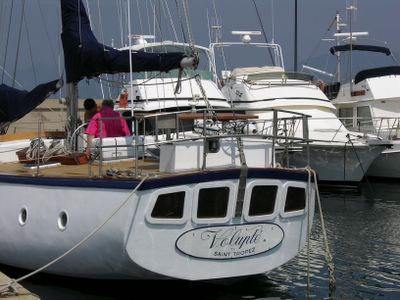
My love of huge yachts is second only to my love of trains. This is despite the fact that ninety-five percent of my sailing experience has (so far) taken place on a sailboat the size of a bathtub. When I was young, my sister and I sailed reconditioned wooden Sailfish around Bearcamp Pond in New Hampshire. Mine, with a black hull and red sail, was named the Red Baron; hers had a girly yellow name that I can’t recall. We also had a sailing dinghy named the White Whale. On vacations in my early teens I sailed for hours, lying on my back watching the sky until the appearance of pine tree tops alerted me that shore was near and I needed to tack back into the center of the pond. I dreamed I was cruising the South Seas in a majestic ketch, a gorgeous lover sunning herself on the teak deck in a blue bikini.
Darlene and I took an hour-long boat trip from Cannes to St. Tropez and back yesterday. She explored the shops and was delighted to find a raspberry tart she has been hunting ever since we arrived in France three months ago. She bought two of them, and we savored them last night in the kitchen back at the apartment. In St. Tropez, I settled into the Café de Paris, whose awning had little nozzles for spraying a fine water mist every 10 seconds, to cool off the patrons. I had a Coke and admired the yachts. A row of them was moored directly across the street from the café. They were from Bikini, Hamilton, and London with names like Cavu, Griff, and Sirahmy. But the one which evoked my adolescent longings was Bushido. It was a wooden ketch with a black hull (just like the Red Baron) and a length of, I’m guessing, 80 feet. Its home port was Georgetown, so it was flying the red Australian flag. I sat and watched Bushido as if enjoying a private session with the Mona Lisa. Last night I fell asleep dreaming I was at its helm, tacking toward Tahiti with a gorgeous woman tanning topside. I think her name was Fifi.
The other yacht which caught my eye was Volupté, home port St. Tropez. The word volupté has tasty meanings in French, including “plaisir sensual, intense et raffiné; vive jouissance, délectation,” which translate into English as sensual pleasure that is intense and refined, lively joy, and delight. Bushido, the name of the black ketch, is the code of the samurai warrior.
Sometimes it seems as if each day’s most alluring sights or impressions offer coded wisdom and guidance. If so, perhaps yesterday’s delights in St. Tropez were pointers toward the complementary values of refined sensual delight and fierce ethical discipline. It takes both to make a yacht truly grand. As we walk along the wharfs at St. Tropez and Cannes, we always come across somebody scraping and sanding a hull or a fitting, as well as the usual scenes of nattily attired guests clinking crystal with each other. Most probably they are not the same people, but the essence of the boats themselves comprises both--bushido and volupté.
Sitting here at the Deep Sun Café on Boulevard Carnot in Cannes, dabbling with lofty images and thoughts, has been a welcome respite from today’s more prosaic reality, the Battle of the Baggage. In three months we have accumulated, little by little, an impressive burden of guide books, French literature, CDs, shoes, and whatnots. The total clearly exceeds the British Airways luggage limits, so I found a shipping company which will air freight a suitcase back to Denver for us, leaving an almost manageable load to haul to the airport next week. Darlene is in Villefranche this morning shopping. My job will be to navigate a 50-kilo Big Bertha down four flights of stairs and then along Canne’s narrow sidewalks to the transit company in 90-degree heat before she returns.
Mind the blog. Mind the baggage. Tack back to open water when you see the tops of the pine trees. Fall asleep savoring whatever the day brought that made you feel sensual and fierce.

Friday, June 24, 2005
Ile Sainte Marguerite
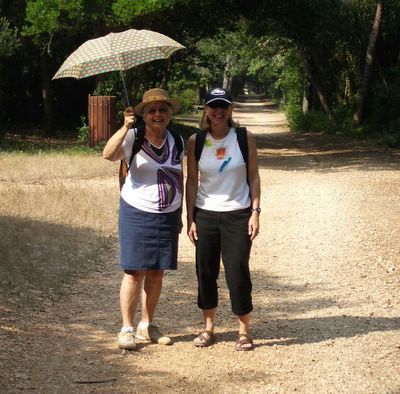
Yesterday we took a 20-minute ferry from Cannes to the island of St. Marguerite, where the mysterious Man in the Iron Mask was imprisoned for 11 years, from 1687 until 1698. Our guides were André and Jacqueline Letullier, our intrepid French friends from Mougins. We walked through tall groves of eucalyptus and pine trees, toured the fort and prison, had a long lunch at one of the two restaurants on the little island, swam, and returned to Cannes sun-soaked and satisfied.
André filled me in on what has to be the most alluring theory of the prisoner’s identity. In this story, Louis XIV imprisoned his twin brother to avoid complications in the royal succession. I imagined this scenario as I stood in the unknown prisoner’s cell, which was a large room with a high, vaulted ceiling and three separate rows of snarling iron bars blocking escape through the window. Beyond the bars, far below, lay the perfectly blue sea. I fingered one of the bars, remembering my boyhood infatuation with the Count of Monte Cristo, wondering how many years of scratching that iron it would take to make even the smallest progress toward freedom. The mystery prisoner of St. Marguerite was constantly guarded, masked, and not allowed to speak with anyone. Meanwhile, maybe, his twin brother was off enjoying life as the Sun King.
This morning I read a long New York Times feature, published June 12th as part of the newspaper’s powerful series on class in America. I could not stop reading the story of Angela Whitiker’s climb from life in a gang-run housing project to life as a registered nurse driving her kids to Little League in an SUV. But it wasn’t the Horatio Alger aspect of the story that impressed me. It was the sense of how my life has been so incredibly fortunate compared to the life of Ms. Whitiker. Because the story was so well-written, it was impossible not to relate to her, to see the world through her eyes. So as I sat at the dining room table early this morning, in our temporary home in Cannes, I got a taste of 10-hour night shifts at the hospital where Richard Speck killed eight nurses, and for the terror Angela Whitiker felt as she arrived two hours early to take the nursing certification test that would grant her entrance into the middle class. In the light of her life, I feel as if I live at Versailles, and I am emboldened to live as purposefully as I can today. I had a similar feeling leaving the unknown prisoner’s cell and walking back out into the sunlight of the Cote D’Azur. What would the Man in the Iron Mask have done with the freedom which I take for granted? Maybe snuck off to Versailles for an short, unpleasant talk with his brother.

Thursday, June 23, 2005
Musée Provence
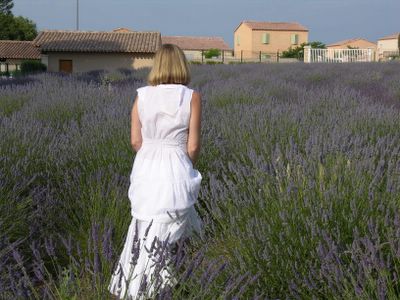
We left Aix Sunday afternoon for a drive north into Peter Mayles country, in search of lavender fields. We stayed in Le Clos des Lavandes, a Maison d’Hote near Lacoste. At the Musée de la Lavande in Coustellet, Darlene made a pretty sight surrounded by lavender in her white flowing skirt. Yesterday morning we explored the Luberon region of high Provence, visiting the ancient towns of Rousillon and Gordes before driving back to Aix for the train to Cannes.
I found Provence baffling. On the one hand, there is no denying the allure of the flowers, the low mountains, the fields of lavender and wheat, the historic towns built topsy-turvy on little outcrops of red stone, the colorful shutters of the buildings, the fresh salads, the rich chocolate cake, and the centuries of history and culture. On the other hand, it feels like Disneyland because of all the shuffling tourists, all of us walking at the same distracted, slow amble that we use in malls, museums, and amusement parks. It is the walk of people who don’t know where they are going and who have very little idea what they are seeing. I remember on St. John in the Virgin Islands, when I volunteered for a reporting job for the local newspaper, how suddenly I found myself walking at a different gait. I strode to an assignment purposefully, tacking through the shuffling tourists in their bathing suits and flip-flops, on my way to somewhere known and desired.
The contrast of these two views of Provence leads me to feel that the “real” Provence is somehow lost, that all that’s left is a huge outdoor museum or theme park. We drive from town to town the way we wander from room to room in the Musée D’Orsay. But this equates “real” mainly with the date. If one could plop oneself down in the middle of Rousillon two or three centuries ago, there would be no lost herd of tourists, no racks of postcards, nothing “fake.” There would also be few people alive over the age of 50. So being 54, I have no desire to live in the “true” Provence, or the “true” Colorado (before all those Easterners ruined it) or the “true” anywhere else, if “true” means everything being the way it was before the arrival of indoor plumbing.
These thoughts led me to the obvious conclusion that the “true” Provence was exactly what I found in Rousillon yesterday morning: beautiful old buildings in a lush countryside, a combination of landscape, history and culture which has attracted people from all over the world. And the real work of Rousillon today is not plowing fields and hauling rock, it’s setting the chairs out for lunch at a café, renovating an old building to create a new business, or figuring out how to expand parking discretely so more people can come and wander around, leaving a trail of Euros behind them.
My French friend Jean-Marie is very discouraged about his country in the wake of the Non vote on the European Constitution. He criticizes France’s slowness to change, to adopt new ideas and ways of handling the realities of the new millennium. He and Joyce, my friend from Harvard, plan to spend more and more time in Morocco. I have been struck by this same disillusionment in the French media these past three months. It’s another source of bafflement for me. Arriving here as an American innocent, seeing everything with amazed eyes, I feel sad that the French are going through such a despondent time.
As we drove our rented car through Provence, we listened to “Matador,” the newest CD by Mickey 3D, a young French group that sings of hopelessness, revolution, and love in music enlivened by Arab influences and rhythms. You can’t detect much hope for the future from their lyrics, but the music is, oddly, full of life and humor, just right for rolling past the lavender fields of Provence. If yesterday had been a short movie, Mickey 3D offered the perfect soundtrack. In this hugely popular group, the travails of France have given birth to a new and original music, recalling the way that American agonies gave birth to jazz and rap.
In Roussillon yesterday, I was taking photos of buildings when I noticed a beautiful young woman arranging herself and winking, as if she assumed I was talking a photo of her. Not a bad idea, I thought, so I walked over and asked if she would pose for a real portrait. Her friend urged her on, suggesting this might be a chance at Hollywood. Leslie, who was born in Metz and lives in Roussillon, loved this thought. I like to think her radiance could be taken as an image of hope for what the young will make of the mess they will inherit in France as well as everywhere else in the world. Leslie, who is 20 years old, does not appear to think she is living in a museum. Perhaps she is smiling at the thought of what she, herself, will make of the future of France.

Tuesday, June 21, 2005
The Garden of Aix
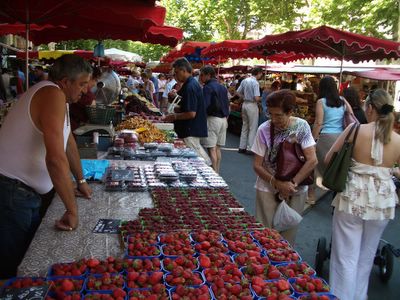
The scene yesterday at the open-air market in Aix-en-Provence
At the home of Joyce and Jean-Marie, I am typing on the Vaio out in the garden. The big table still has the yellow and orange Provençal-style tablecloth on it from last night’s turkey dinner for six. We were joined by Joyce’s long-time girlfriend Sabina and Sabina’s partner Michael, both visiting from Germany. When Michael sheepishly lit up a Gitane blonde after the dessert course of cheese and cherries, I said I would love to join him, but I wouldn’t be able to until midnight, when a new cigarette week starts. By the time we had thoroughly debated the future of Europe, the French and German economies, marriage and divorce, and childhood traumas, I was shocked to see that midnight was less than a half a minute away. So I had the chance to smoke one of Michael’s Gitanes as a pleasant cap to the evening.
Darlene and I have settled into Aix-en-Provence as if finding a kind of haven. We enjoy Cannes, but its tourist-movie star vibe feels somewhat airy and unreal compared with the rootedness of Aix. Joyce took us to the vast market of fresh fruit, vegetables, pastries, bread and other delights yesterday to buy supplies for the dinner. Darlene tried on flowing outfits of raw silk from a clothing designer who was one of the artisans who had set up booths along the wide central boulevard, Cours Mirabeau. A small crowd of French women gathered to admire the fashions and encourage her, so by the time I returned with the turkey, she had completed a prize purchase.
We visited Jean-Marie’s mother in the country outside of Aix. Her home has family furniture from the 1700s, and a pool where I swam a few laps before my goggles conked out. She also helped with a poem I drafted in French yesterday, here in the garden, providing a title with just the right play on French words that I was seeking.
This morning a long exercise walk is in the works, to be followed by brunch at a restaurant. This afternoon Darlene and I will drive a rented car north for an hour to the Luberon. I found a bed and breakfast near the lavender fields, which Darlene has been dying to see ever since she saw her first postcards of them in Villefranche. We extended our return to Cannes by a day so we could make the side trip in search of lavender.



